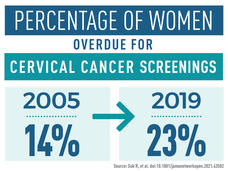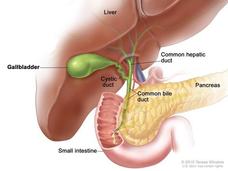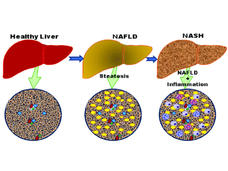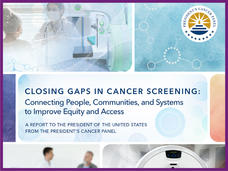February 2022 - Cancer Currents Blog
-
Experimental Medulloblastoma Treatment Gets a Boost with Nanoparticles
A nanoparticle coating may help cancer drugs reach medulloblastoma tumors in the brain and make the treatment less toxic. Mice treated with nanoparticles containing palbociclib (Ibrance) and sapanisertib lived substantially longer than those treated with either drug alone.
-
Why Are Many Women Overdue for Cervical Cancer Screening?
The rates of timely cervical cancer screening fell between 2005 and 2019, researchers found, and disparities existed among groups of women. The most common reason for not receiving timely screening was lack of knowledge about screening or not knowing they needed screening.
-
Can Chronic Graft-Versus-Host Disease Be Prevented?
Removing immune cells called naive T cells from donated stem cells before they are transplanted may prevent chronic graft-versus-host disease (GVHD) in people with leukemia, a new study reports. The procedure did not appear to increase the likelihood of patients’ cancer returning.
-
Durvalumab Modestly Improves Survival in Advanced Biliary Tract Cancer
Adding durvalumab (Imfinzi) to standard chemotherapy modestly extended how long people with advanced biliary tract cancer lived, results from the TOPAZ-1 trial show. The immunotherapy drug may now be the standard first-line therapy for this hard-to-treat cancer.
-
Air Is Life: The Navajo Nation’s Historic Commercial Tobacco Ban
With the passage of the Air is Life Act of 2021, the Navajo Nation enacted the most comprehensive ban on commercial tobacco products of any American Indian tribe to date.
-
Study Identifies Potential Drug Target to Prevent Some Liver Cancers
Researchers have found that mice that lack β2-spectrin protein in their livers are protected from nonalcoholic fatty liver disease and the most common kind of liver cancer, hepatocellular carcinoma.
-
President’s Cancer Panel Report: Closing Gaps in Cancer Screening for All Americans
Dr. John P. Williams, chair of the President’s Cancer Panel, summarizes the panel’s new report, Closing Gaps in Cancer Screening: Connecting People, Communities, and Systems to Improve Equity and Access.





